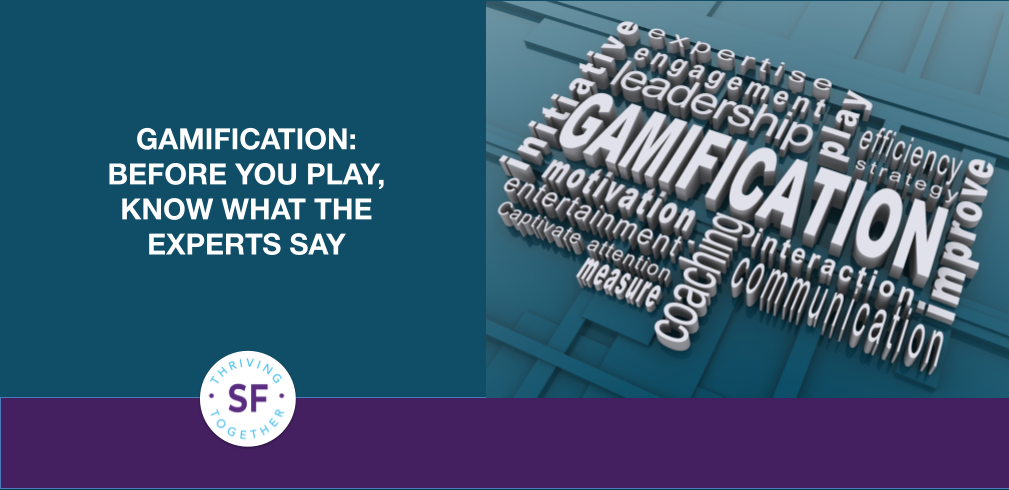A high-level manager from a Fortune 500 company created a game based on one of my motivation books and reached out for feedback. I love games and wanted to support her efforts. But we ran into an early roadblock when I asked her the game’s purpose. She stated her intention: I want to teach people about their psychological needs in a fun way. Her response was spot on. But the problem was that the way she had designed the game would give anyone playing it a much different reason for playing: to win. Ironically, her gamification intended to teach the skill of motivation undermined the very thing she was hoping people would learn: alternatives to suboptimal motivation.

It comes as no surprise that “gamification” is a growing phenomenon in organizations. Sales groups started the trend based on the belief that most salespeople are motivated by money, trips and winning. Then, ironically, HR departments embraced gamification to improve their employees’ health and well-being. Now gamification is endorsed by organizations to facilitate education and effective performance.
Where can gamification go wrong?
To help explain why so many well-meaning managers get gamification wrong, I turned to Dr. Edward Deci and Dr. Richard Ryan, the fathers of Self-Determination Theory. They are arguably the most prominent motivation researchers in the world. Along with Dr. Scott Rigby, they are also cofounders of Immersyve . They are dedicated to studying and applying motivation science to gaming — including video games and the gamification of education.
How did these lauded researchers get involved in video gaming? For starters, if you don’t play some online interactive game, you are in the minority. In the United States, games generate almost twice the revenue of movies. The biggest-selling video game, Pokémon, has grossed over $90 billion compared to the number one movie of all time, Avatar, at less than $3 billion. Explains Ryan, “Games have an incredible motivational pull. The better we understand, the deeper psychology behind the palpable love people have for video games, the more we can harness that energy to enhance education, training, and social and leadership skills development.”
But the experts at Immersyve warn against implementing gamification strategies without the insight of motivation science. Rigby points out, “Many companies rush too quickly to gamification, making the mistake of confusing the tactic of game mechanics as the goal. They turn internal websites for sales or human resources into games or contests that can often lead to ill-advised decisions to wrap glitzy badges and rewards around experiences. Those tactics not only don’t sustain motivation or build value but can hurt the relationship with employees because it communicates that the value lies in the badges and points, rather than the substance of your business or the health of your employees.”
2 things to remember before gamification
Rigby, Ryan and Deci offer two critical pieces of advice if you are considering games and contests to “motivate” employees:
- Don’t begin with the goal to create a game-like approach: Begin with the intent to create a vehicle where people can be optimally motivated and sustain engagement. Rigby explains, “Thoughtful application of game design can facilitate an authentic satisfaction of people’s psychological needs for choice, connection, and competence. Understanding the nature of human motivation is essential for communicating to employees that your organization and its offerings are where the value lies — not the badges and confetti sprinkled on top.”
- Think about motivation versus rewards: The two concepts are very different and can be antagonistic. Research confirms that games based on reinforcing performance through rewards rather than recognizing and supporting intrinsic motivators do not yield enjoyment and immersion (which increase comprehension and competence), the likelihood a person will play next week (indicating sustained engagement, autonomy, and choice) and a preference to play more games by a particular developer (reflecting loyalty and connection).
According to Deci, who did the first studies of monetary rewards and intrinsic motivation, “Giving rewards to reinforce learning undermines short-term learning and long-term engagement in games — and goals in the workplace. However, people will find activities intrinsically rewarding and more deeply satisfying when their choice, connection and competence are respected, encouraged and supported by game elements and their managers at work.”
Despite the misuse of gamification in the workplace, wouldn’t it be amazing if we could help people fulfill their psychological needs and experience optimal through the games we play?
Susan Fowler, CEO of Mojo Moments, is the bestselling author of “Why Motivating People Doesn’t Work … And What Does: The New Science of Leading, Engaging, and Energizing.” Her latest book, “Master Your Motivation: Three Scientific Truths for Achieving Your Goals,” presents an evolutionary idea: motivation is a skill. Providing real-world examples and empirical evidence, Fowler teaches you how to achieve your goals and flourish as you succeed. She is also the author of bylined articles, peer-reviewed research, and eight books, including the best-selling “Self Leadership and The One Minute Manager” with Ken Blanchard. Tens of thousands of people worldwide have learned from her ideas through training programs. For more information and the free What’s Your MO? survey for exploring your motivational outlook, visit SusanFowler.com or MojoMoments.com.
Opinions expressed by SmartBrief contributors are their own.
_______________________
If you enjoyed this article, sign up for SmartBrief’s free e-mails on leadership, career development, and HR, among SmartBrief’s more than 200 industry-focused newsletters.
